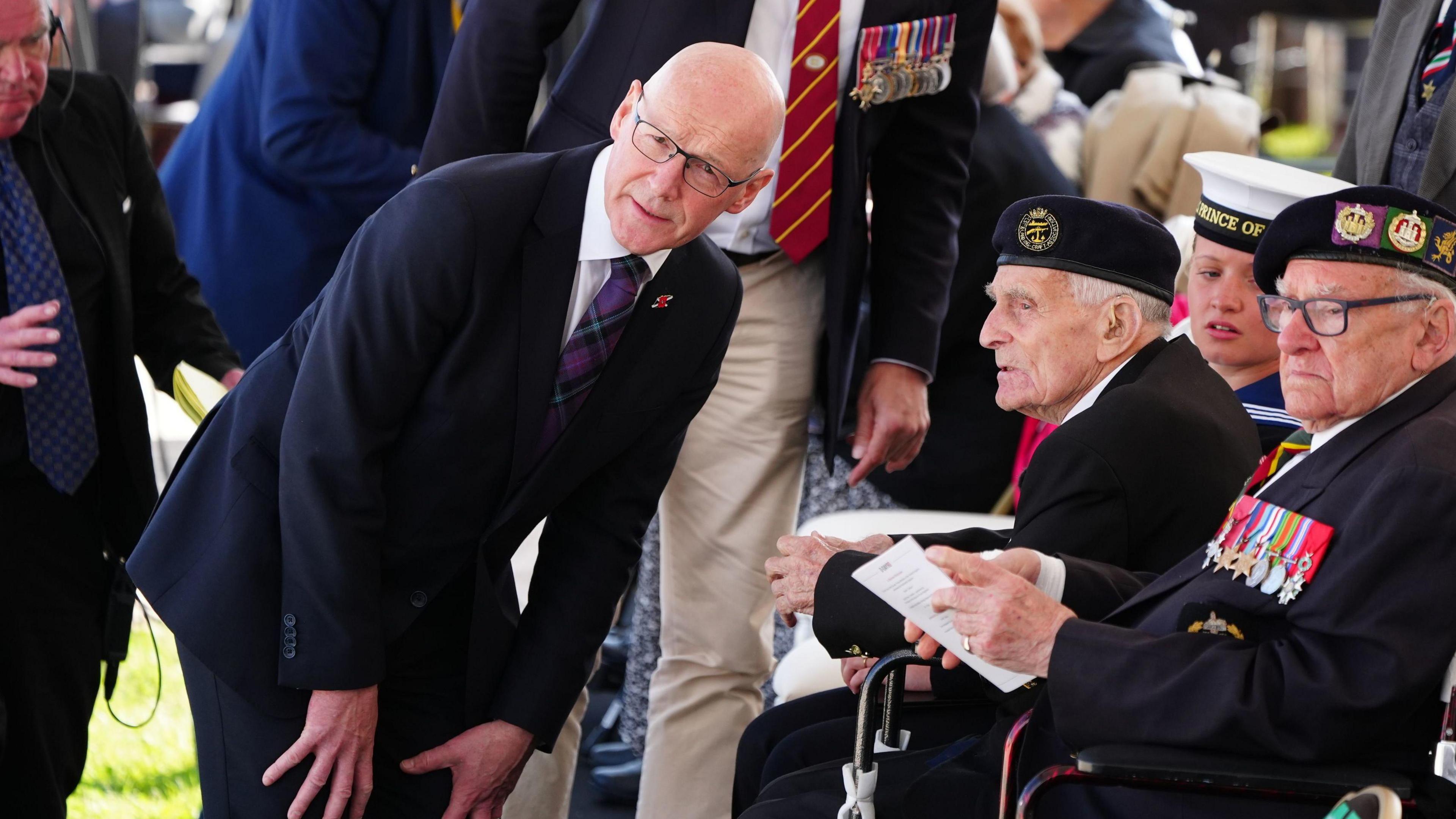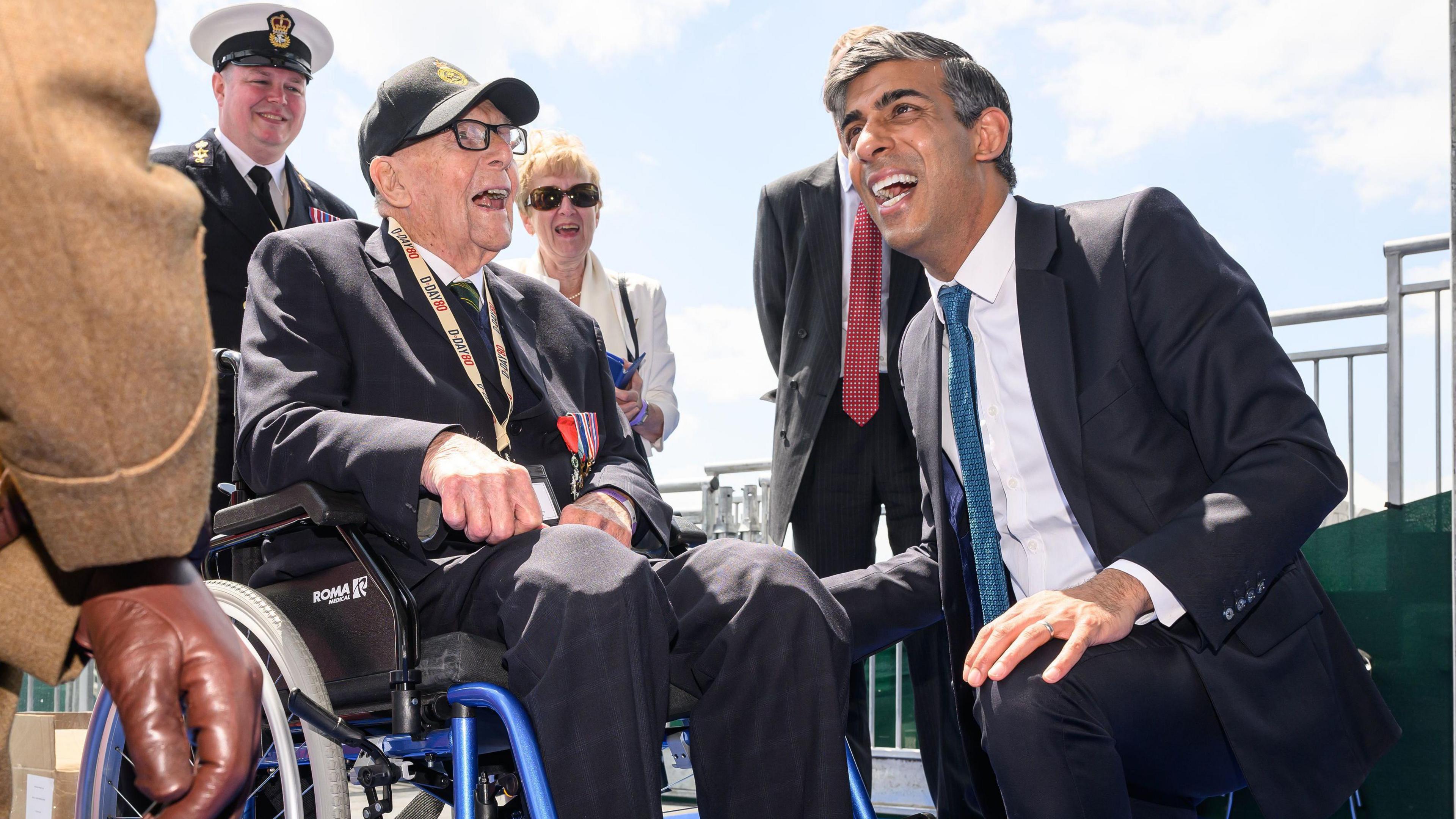Swinney condemns Sunak's early return from D-Day events

Mr Swinney met veterans at the UK national commemorative event in Normandy for the 80th anniversary of D-Day
- Published
First Minister John Swinney has condemned the prime minister's decision to leave D-Day commemoration events in France early.
Campaigning in Glasgow Mr Swinney said Mr Sunak's actions were "truly, breathtakingly terrible".
The prime minister travelled back to the UK from Normandy on Thursday to take part in an ITV interview.
Scottish Conservative leader Douglas Ross said the 1944 landings were a "crucial moment in our history" and Mr Sunak was right to apologise.
But UK Labour leader Sir Keir Starmer said the prime minister "will have to answer for his own actions".
And, writing on X, external, Scottish Liberal Democrat leader Alex Cole-Hamilton said the move could "define or even end an entire career".
Rishi Sunak apologises for leaving D-Day events early, calling it a 'mistake'
- Published7 June 2024
D-Day absence an extraordinary own goal from the Conservatives
- Published7 June 2024
Mr Swinney told supporters in Springburn that he paused campaigning for 48 hours to attend the 80th anniversary events in Portsmouth and Normandy.
Mr Sunak missed a ceremony on Omaha Beach and was represented by Foreign Secretary David Cameron.
Lord Cameron was photographed at the event alongside US President Joe Biden, French President Emmanuel Macron and German Chancellor Olaf Scholz.
Asked by BBC Scotland News about the prime minister's decision to travel home prematurely, Mr Swinney said: "I think it is a truly, breathtakingly terrible decision on a number of counts."
The first minister said it was "disrespectful" to veterans and questioned why Mr Sunak missed a gathering of world leaders.
"He is the prime minister of the United Kingdom just now and he should have been there to represent the international interests of the United Kingdom," he said.
"He came home to perpetuate a story which we now know to be absolutely baseless.
"That is not the hallmark of a prime minister."

Rishi Sunak met D-Day veterans in Normandy on Thursday before returning to the UK for a broadcast interview
Mr Swinney was referring to Mr Sunak's tax claims, made during his ITV debate with Labour leader Sir Keir Starmer on Tuesday.
The UK statistics watchdog said anyone who heard the prime minister say Labour would raise taxes by £2,000 per working household would have no way of knowing that was a sum totalled over four years.
It also repeated the objection raised by the Treasury's top civil servant that the Conservatives had presented the figure as if it had been produced by impartial civil servants.
Scottish Labour leader Anas Sarwar accused the prime minister of "deliberate misinformation".
But Mr Sunak has defended his characterisation of Labour's tax plans.
In an interview for ITV's Tonight programme, recorded on Thursday, the prime minister replied "no" when asked if he was "willing to lie in order to stay in power".
Mr Sunak added that Labour were "rattled that we've exposed their plans to raise tax".


Earlier, Douglas Ross - who confirmed on Thursday he will stand in the election - said the prime minister was right to say sorry over his actions on the landmark D-Day anniversary.
The Scottish Tory leader told BBC Radio's Good Morning Scotland programme that Mr Sunak had "looked at that and reflected".
Mr Ross added: "It was a crucial moment in our history and it is right it is recognised fully and properly, and that is why it is also correct the prime minister has apologised."
And Scottish Lib Dem leader Alex Cole-Hamilton said: "During elections there are moments in time that don’t just punctuate the campaign, but can define or even end an entire career.
"Rishi Sunak’s abandonment of the D-Day commemorations and the veterans we honour on the beaches of Normandy feels like one such moment."
It is not the first time a politician has faced criticism for missing a D-Day event.
In 2004 Scotland's then First Minister Jack McConnell admitted he made a mistake by initially deciding to attend a golf club dinner rather than the 60th anniversary D-Day commemorative events.
He was forced into a U-turn after a backlash over his plans to send finance minister Andy Kerr to Normandy instead.
Mr McConnell, who is now a Labour peer, told Cabinet colleagues at the time: "When I get it wrong and can take the chance to correct that decision, I am happy to do so."
- Published7 June 2024

- Published24 May 2024
